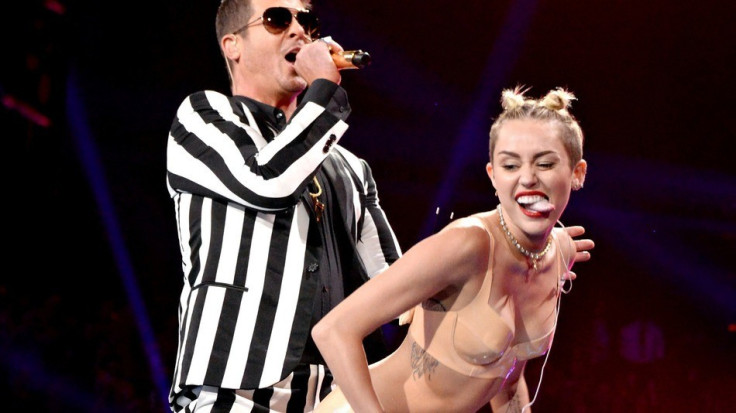Miley Cyrus and Robin Thicke's Date-Rape Song Sparks University Ban

Universities across the UK are taking a stand against misogynistic and violent music by banning Robin Thicke's controversial chart-topper Blurred Lines from student union bars.
The University of Edinburgh was one of the first of 20 student unions to prohibit the summer smash as part of its policy to "End Rape Culture and Lad Banter on Campus".
Other institutions including Nottingham, Anglia Ruskin, Brighton, Birmingham, Exeter, Kingston, and West Scotland quickly followed suit by imposing their own bans. They say the move was to safeguard female students.
"The language within the lyrics and the images within the promotional video are utterly degrading to the female subject," said Exeter's Students' Guild.
Despite climbing to No 1 across the globe, Blurred Lines was widely criticised for underlying pro-rape lyrics. The video featured a bevy of topless models draping themselves over fully clothed men.
Thicke retaliated that the song was a "feminist movement" and insisted that the lyrics were tongue-in-cheek.
"It's supposed to stir conversation, it's supposed to make us talk about what's important and what the relationship is between men and women," he said. "If you listen to the lyrics it says 'That man is not your maker'. It's actually a feminist movement within itself."
As some universities continued to debate sexist and inappropriate lyrics in the song, a top headmistress launched a scathing attack on celebrities for manipulating young girls.
Jo Heywood, head of all-girl Heathfield School in Ascot, said Miley Cyrus' conversion from clean-cut pop star to raunchy performer was a disgrace.
"I have long been yearning for more appropriate female role models for today's young women to look up to," she said.
"I am more than a little concerned that some of the so-called role models young girls may look up to are giving them confusing mixed messages."
Rizzle Kicks have also spoken out against the misogynistic and homophobic lyrics in rap.
The duo, Jordan Stephen and Harley Alexander, admitted that they struggled to listen to hip-hop.
Stephens told the BBC: "The stuff I'm hearing in the mainstream, it's overly-misogynistic and it's still homophobic. It does my head in.
"I don't think we know any women - smart women, who you'd want to be friends with - who would proclaim themselves as a 'bad bitch'."
© Copyright IBTimes 2025. All rights reserved.





















